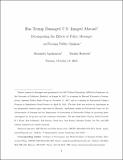| dc.contributor.author | Agadjanian, Alexander | |
| dc.contributor.author | Horiuchi, Yusaku | |
| dc.date.accessioned | 2021-01-26T15:10:31Z | |
| dc.date.available | 2021-01-26T15:10:31Z | |
| dc.date.issued | 2018-10 | |
| dc.identifier.issn | 0190-9320 | |
| dc.identifier.issn | 1573-6687 | |
| dc.identifier.uri | https://hdl.handle.net/1721.1/129564 | |
| dc.description.abstract | The U.S. President Donald Trump has frequently made foreign countries central to his political messages, often conveying animosity. But do foreign citizens react more to the speaker of these messages—Trump himself—or their content? More generally, when people are exposed to messages sent from foreign countries, are their attitudes influenced by information heuristics or information content in messages? Although related studies are abundant in the literature of American public opinion, these questions are not fully examined in the literature of foreign public opinion. To address them, we used Japan as a case and fielded a survey experiment exposing citizens to U.S. policy messages that varied by source, policy content, and issue salience. Results suggest that while the source cue (Trump attribution) causes negative perceptions of the U.S., the policy content (cooperative vs. uncooperative) has a larger effect in shaping opinion of the U.S. Furthermore, analysis of interaction effects shows that only when U.S. policy approach is uncooperative does the Trump attribution have significantly negative and large effects. We conclude that foreign citizens rely more on policy content in transnational opinion formation—an aspect that past research in this area has overlooked. Substantively, these findings may demonstrate that even under a presidency that has alienated foreign countries and seemingly undermined U.S. stature in the world, foreign opinion toward the U.S. does not hinge entirely on its political leader. In short, Trump has not irreparably damaged the U.S. image abroad. | en_US |
| dc.publisher | Springer Science and Business Media LLC | en_US |
| dc.relation.isversionof | https://doi.org/10.1007/s11109-018-9511-3 | en_US |
| dc.rights | Article is made available in accordance with the publisher's policy and may be subject to US copyright law. Please refer to the publisher's site for terms of use. | en_US |
| dc.source | Springer US | en_US |
| dc.title | Has Trump Damaged the U.S. Image Abroad? Decomposing the Effects of Policy Messages on Foreign Public Opinion | en_US |
| dc.type | Article | en_US |
| dc.identifier.citation | Agadjanian, Alexander and Yusaku Horiuchi. "Has Trump Damaged the U.S. Image Abroad? Decomposing the Effects of Policy Messages on Foreign Public Opinion." Political Behavior 42, 2 (June 2020): 581-602 © 2018 Springer Science Business Media, LLC, part of Springer Nature | en_US |
| dc.contributor.department | Massachusetts Institute of Technology. Department of Political Science | en_US |
| dc.relation.journal | Political Behavior | en_US |
| dc.eprint.version | Author's final manuscript | en_US |
| dc.type.uri | http://purl.org/eprint/type/JournalArticle | en_US |
| eprint.status | http://purl.org/eprint/status/PeerReviewed | en_US |
| dc.date.updated | 2020-09-24T21:37:47Z | |
| dc.language.rfc3066 | en | |
| dc.rights.holder | Springer Science+Business Media, LLC, part of Springer Nature | |
| dspace.embargo.terms | Y | |
| dspace.date.submission | 2020-09-24T21:37:47Z | |
| mit.journal.volume | 42 | en_US |
| mit.journal.issue | 2 | en_US |
| mit.license | PUBLISHER_POLICY | |
| mit.metadata.status | Complete | |
